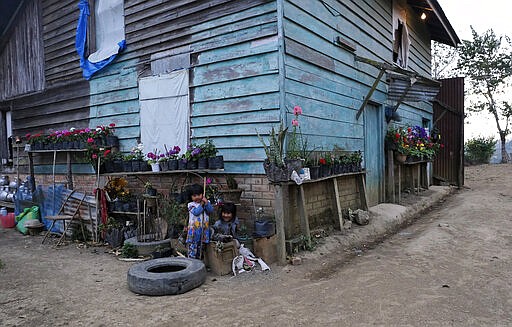Workers crowd trains for home as Indian cities close further
NEW DELHI (AP) — As cities and factories were closing in virus-control measures, Indian migrant workers crowded a railway station to reach their home villages Sunday, suggesting social distancing could be difficult in the world's second-most populous country.
The scene Sunday in Uttar Pradesh state was just one of many examples of crowding on the same day Prime Minister Narendra Modi had called on Indians to stay home for a 14-hour “people's curfew” to halt the spread of the virus.
In answer to his call for people to collectively cheer front-line health care workers at 5 p.m., a cacophony was heard in the capital as people clapped, rang bells, banged pots and pans, played music and exploded fireworks, sending crows and parakeets streaming from treetops, and stray dogs and cows into the deserted streets.
But elsewhere in Delhi and in India's financial capital of Mumbai, people could be seen pressed together in close quarters.
Afterward, the government of Delhi, a federal territory, issued weeklong stay-at-home orders, canceling public transport services, closing shops, offices, factories and houses of worship, and allowing people to leave their homes only for basic necessities. Services such as police and health care were exempted from the rule. No commercial airplanes from abroad are allowed to land in India for a week starting Sunday.
Delhi joined the neighboring state of Haryana, home to the multinational corporate hub of Gurugram, as well as the states of Rajasthan, Bihar, Uttarakhand, Telangana and the federal territory of Jammu and Kashmir with near-total bans on public movement.
India has at least 329 active cases of infection with the new coronavirus and seven deaths from COVID-19, the illness it causes.
Earlier Sunday, thousands of people from Mumbai and elsewhere in the western state of Maharashtra, jostled at a railway station in Prayagraj in Uttar Pradesh, India's most populous state. Police struggled from a distance to control the crowds, who were waiting to be taken to their villages by buses and taxis that appeared unlikely to come.
“We are playing with our health by crowding railway stations and bus stands,” Modi said in a tweet.
Indian Railways later suspended all passenger train services until March 31, although freight services will continue. It was unclear what this would mean for people stranded at railway stations.
In recent days, migrant workers hauling backpacks have swarmed overcrowded trains across many Indian cities, an exodus among panic-stricken day laborers that has sparked fears the virus could spread to the countryside.
The typical bustle of New Delhi, meanwhile, was otherwise silent on Sunday, with nearly empty buses and taxis plying the city's lightly trafficked roads, gates to public gardens, temples and churches locked, and building guards with scarves tied around their faces seated outside on plastic chairs watching empty streets.
A road in New Delhi near a Sufi shrine where hundreds of pilgrims often camp was empty except for an occasional passing car.
While some Indian states had already issued stay-in-place orders and closed borders, Sunday was India's first nationwide effort at social isolation practices that the World Health Organization believes are critical to flattening the infection curve worldwide.
Officials said 23 people have recovered from COVID-19, and have not documented any community spread in India.
While the coronavirus can be deadly, particularly for the elderly and people with other health problems, for most people it causes only mild or moderate symptoms, such as fever and cough. Some feel no symptoms at all and the vast majority recover.
India's government has made fervent appeals to the public to practice social distancing and good hand hygiene. India also was one of the first countries to essentially shut its borders and deny entry to all but a select few foreigners.
However, experts have said indigenous spread of the disease in India, where tens of millions live in dense urban areas with irregular access to clean water, is inevitable.
___
Associated Press journalist Rajesh Kumar in Prayagraj, India, contributed to this report.






























